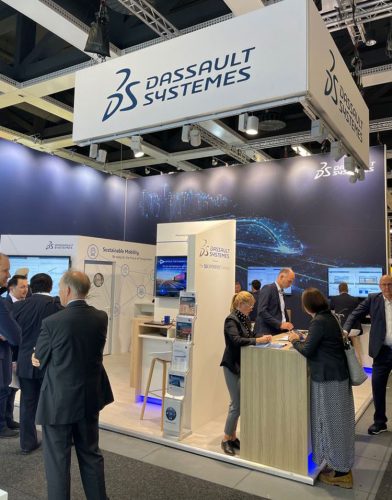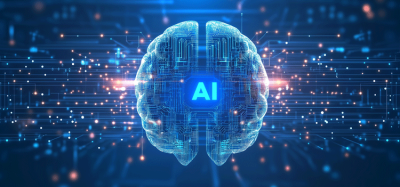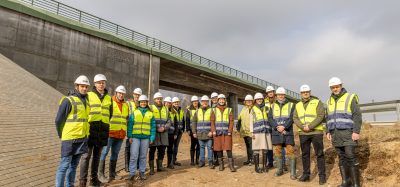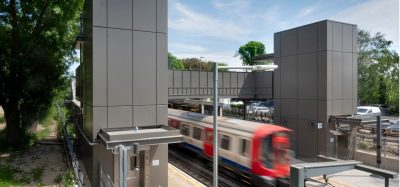Accelerating rail’s digital transformation with DELMIA solutions
Posted: 9 November 2022 | Dassault Systèmes | No comments yet
The growing need for greener solutions in the transport and logistics industry presents an incredible opportunity for rail manufacturers and service providers to gain significant market share. However, success in the future relies on how we respond to everyday business challenges while also meeting our environmental commitments. The key to unlocking more sustainable rail operations – from train manufacturing to logistics to crew planning and scheduling – is accelerating digital transformation by leveraging advanced optimisation and scheduling and digital or virtual twin technology.
At InnoTrans 2022, DELMIA CEO, Guillaume Vendroux, shared his insights into this and the future of rail operations. This article summarises the key takeaways from his presentation – specifically, how the Virtual Twin Experience and DELMIA solutions can accelerate rail vehicle and component companies, infrastructure projects, and operational planning.
How scheduling and optimisation enable efficient production
The rail industry’s green reputation makes it an attractive prospect to those seeking to transition to low-carbon transport modes to meet their sustainability KPIs. To cater to this while remaining competitive, rail operators, manufacturers, and construction organisations need to evolve the efficiency of their services.


Advanced optimisation and scheduling technologies can facilitate this. By matching demand and supply and optimising product manufacturing operations, companies can increase the efficiency of resource utilisation and use of energy and materials by reducing resource consumption, scrap, and waste. For example, grouping operations based on similar characteristics, like energy-intensive resources, prevent unnecessary maintenance time and effort.
On a larger scale, optimising rail supply chains enables the set-up of a sustainable supplier network, which in turn drives a more circular economy. As the Ellen MacArthur Foundation identified, “creating new value chains and optimising the flows of material across a company” as one of the four main opportunities in the circular economy transition. For instance, sustainable sourcing provides visibility of a product’s carbon footprint within a supply chain and considers suppliers’ emissions and transport (including distance and transportation mode). In addition, it helps optimise emissions and financial costs and supply plans to achieve a sustainable sourcing strategy.
Enhancing rail sustainability with nextgeneration digital twin technology
Rail companies can improve both product and production by connecting product design engineering with production system design engineering to assess their environmental footprint by tracking externalities. Harnessing the power of simulation via the 3DEXPERIENCE platform, the Virtual Twin Experience helps rail manufacturers virtually verify new production lines to reduce the need for physical mock-ups and simulate manufacturing systems to drive greater efficiency. And thanks to the solution’s realtime monitoring and gamification capabilities, rail organisations can maximise visibility over operations and be empowered to evaluate and improve a wide array of rail business processes, and identify opportunities to reduce environmental impact.
A digital strategy in demand-based planning, resource optimisation and systems integration is needed to provide rail organisations the agility and flexibility to respond to sustainability demands and remain profitable. This strategy should include:
- Advanced simulation with virtual twins to improve efficiency, strengthen capacity planning and explore alternative energy resources
- Complete end-to-end integration for better collaboration and increased agility across rail freight planning, supply chain management, rolling stock utilisation and yard management
- Artificial intelligence, machine learning and big data for freight train automation and predictive maintenance.
With the Virtual Twin Experience and our optimisation solutions, DELMIA can help you execute this strategy. In addition, our 20 years of deep rail expertise makes us the digital partner for the complete lifecycle of train and railway operations.
DELMIA solutions support the rail industry with innovative strategies to enhance efficiency, optimise cost and empower sustainable next-generation operations, providing the must-have capabilities to deal with today’s industry challenges and gain future value.
At InnoTrans 2022, Global Railway Review interviewed DELMIA CEO Guillaume Vendroux. Click here to watch the video.
Issue
Related topics
Big Data, Digital Twins, Digitalisation, InnoTrans, InnoTrans 2022, Technology & Software







